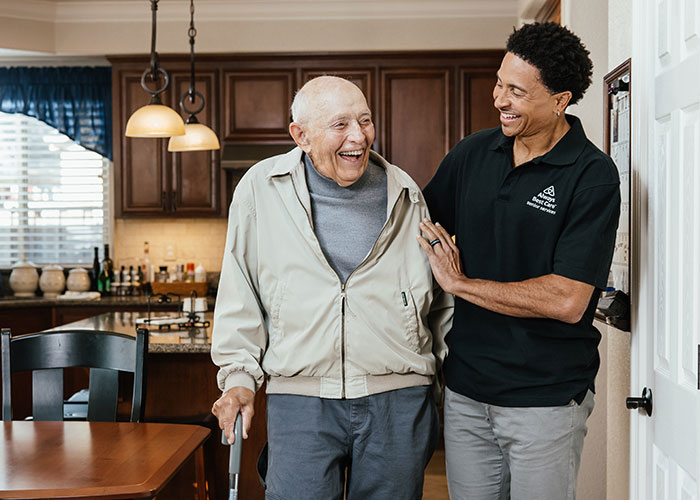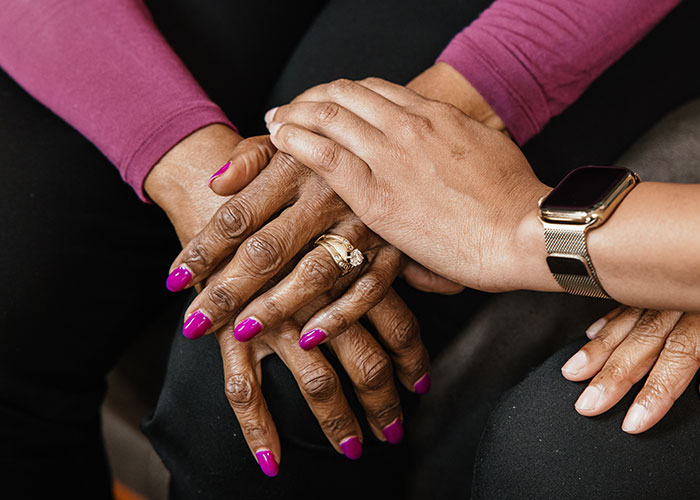Why Can Old People Be So Mean? [Causes, Strategies & FAQs]
![Why Can Old People Be So Mean? [Causes, Strategies & FAQs]](https://cdn.alwaysbestcare.com/wp-content/uploads/2025/05/why-are-old-people-so-mean-hero-image.jpg)
Table of Contents
Why Are Some Old People So Mean? Key Points
- Older adults can appear mean or rude due to underlying factors such as chronic pain, cognitive decline, or loss of independence
- You can manage aggression in the elderly by staying calm, identifying possible triggers, and creating a safe environment
- While you can’t always prevent rudeness in older adults, understanding the cause and adjusting your approach can ease tension and improve communication
Caregiving can strain both your physical and emotional well-being, particularly when an older adult displays aggression.
More than 60% of caregivers report increased levels of stress and worry, often caused by unpredictable actions and emotional outbursts.
If your elderly loved one is showing signs of aggression, remember that it’s not usually intentional. Their behavior is often the result of underlying factors such as pain or changes in cognitive function.
In this article, we will:
- Explain the common reasons why old people are so mean
- Share tips on how to manage their outbursts
- Highlight the support and care services available at Always Best Care
What Causes Aggression in the Elderly?
There are various factors that can contribute to this behavior, including:
1. Hormonal Changes
As we age, hormonal changes can significantly affect emotional health.
In women, declining estrogen during menopause often leads to mood swings, anxiety, and irritability.
Men, on the other hand, experience a gradual testosterone decline, also known as andropause. This often leads to emotional changes and physical symptoms like weight gain, hair loss, and reduced libido.
2. Physical Decline and Chronic Pain
As we get older, it’s common to experience reduced mobility and health issues such as vision or hearing loss, a weaker immune system, and heart or lung problems.
Chronic pain can disrupt sleep and lower energy, making emotional resilience more difficult.
3. Dementia
Aggression is common in dementia, often driven by symptoms like confusion, paranoia, hallucinations, and disorientation.
Triggers like loud noise, routine changes, discomfort, or feeling rushed can cause fear or misinterpretation. These outbursts are typically stress responses, not intentional behavior.
4. Urinary Tract Infection (UTI)
Urinary tract infections (UTIs) can cause inflammation that disrupts brain chemistry, leading to sudden confusion, agitation, or irritability, symptoms often mistaken for mood or memory problems.
5. Loneliness and Social Isolation
About one in three older adults struggles with loneliness, especially those living alone or coping with loss.
Even with family nearby, busy lifestyles often limit meaningful connections. Over time, this emotional strain might weaken social skills, intensify feelings of isolation, and sometimes lead to irritability or aggression in older adults.
6. Loss of Independence
Losing the ability to manage daily tasks such as driving, handling finances, or managing personal care can be frustrating for elderly individuals.
For those who value independence, relying on others may feel humiliating or even threatening, often leading to anger or defiance.
7. Sleep Issues
Nearly 50% of older adults report having sleep issues.
With aging, staying asleep through the night often becomes more difficult. Persistent fatigue can wear down patience and heighten irritability, so if a senior loved one seems on edge, poor sleep might be to blame.
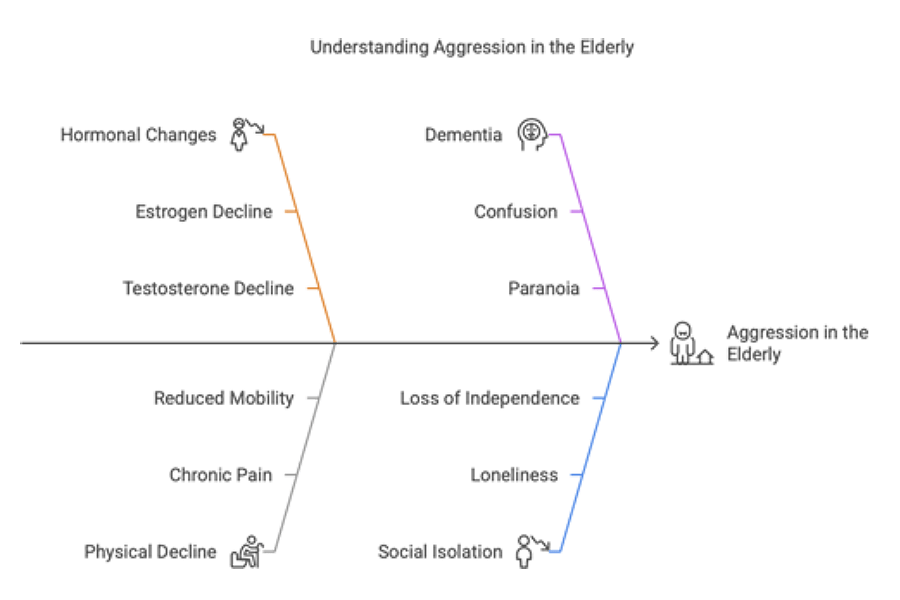
12 Tips on How To Manage Angry Old People
Trying to manage aggression in older adults? These coping strategies can help make a difference.
1. Look for Triggers
Aggressive behavior usually has a trigger. For example, does your loved one get upset when they’re rushed or when routines change?
Identifying these triggers can help you prevent future outbursts by creating a calmer, more predictable environment.
2. Stay Calm
Your response matters. Stay calm, speak slowly, and show warmth, even under stress.
Short, reassuring phrases such as “You’re safe,” “I’m here,” or “I’ve got you” can offer comfort and stability. Avoid arguing or correcting, especially if they’re confused, as it can increase agitation instead of helping.
3. Keep a Steady Routine
Elderly individuals often feel more secure with structure. Keep daily routines as consistent as possible, including meals, rest, and medications.
If something needs to change, let them know calmly and ahead of time to ease their anxiety.
4. Declutter
A cluttered or chaotic space can be overwhelming and contribute to frustration, as it increases sensory overload.
To help your elderly loved one, create a calm, organized environment with minimal distractions by clearing unnecessary items from walkways and surfaces, using soft lighting, limiting background noise, and keeping essential items in easy-to-reach areas.
5. Redirect, Don’t Confront
If you notice agitation building, try gently changing the subject or activity.
Redirect their attention to something calming, like listening to music, going for a walk, folding laundry, or flipping through old photos. A simple shift in focus often works better than trying to reason things out.
6. Validate Their Feelings
Even if what they’re saying doesn’t make complete sense, their emotions are real. Instead of dismissing or correcting your elderly loved one, try acknowledging what they feel.
Phrases such as “That sounds frustrating” or “I understand this is hard” can help them feel heard and safe.
7. Use Gentle Physical Touch
When it feels right, a gentle touch, like a hand on the shoulder, holding their hand, or a soft hug, can provide comfort and connection. Always approach slowly and respectfully, especially if they’re on edge.
8. Pay Attention to Body Language
Your tone, facial expressions, and posture have the power to convey more than just your words. Keep your body relaxed, your tone warm, and your expressions soft. Avoid standing over them or moving too quickly, which can feel intimidating or rushed.
9. Watch for Unmet Needs
Hunger, thirst, pain, fatigue, or even a condition like a UTI can lead to irritability or aggression.
Make sure their basic needs are taken care of and keep an eye out for signs of discomfort they might not be able to clearly express.
10. Step Away if Needed
If emotions start to escalate, it’s okay to step away for a moment and let things cool down. Give them some space, then come back with a calm and reassuring presence.
11. Encourage Independence and Dignity
Losing control over daily life can be frustrating.
Whenever possible, offer choices like what to eat, what to wear, or which activity to do. Giving them a sense of control, even in small ways, can make a big difference.
12. Reach Out for Support
Caring for a loved one is a big responsibility, but you don’t have to carry it alone. If aggressive behavior happens often or feels unsafe, it’s important to talk to a doctor or specialist.
There could be underlying medical issues or cognitive changes that need professional care.
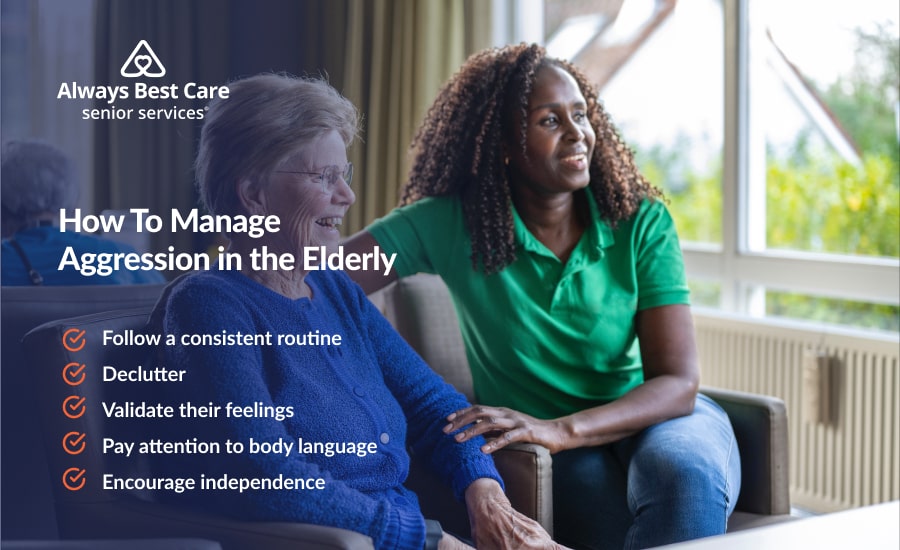
Technologies To Help Manage Aggression in the Elderly
As we get older, managing our emotions can become harder, often due to increased isolation or physical discomfort.
Fortunately, technology provides helpful tools that can ease frustration, calm agitation, and support emotional well-being for older adults.
1. AI-Powered Chatbots and Voice Assistants
AI-powered chatbots and virtual assistants can act as calm, compassionate companions, helping older adults cope with emotional stress.
Benefits include:
- Offers immediate, non-judgmental conversations that can de-escalate anger or agitation
- Provides personalized suggestions such as relaxation techniques or guided breathing
- Connects users to caregivers or therapists through integrated telehealth features
- Sends reminders for medication, meals, or activities, helping to reduce confusion and stress
2. Smart Speakers and Virtual Assistants
Smart devices like Amazon Echo or Google Nest can serve as everyday companions, providing routine, entertainment, and emotional support.
Benefits include:
- Enables hands-free operation, ideal for those with limited mobility or dexterity
- Plays calming music, audiobooks, or lead breathing exercises on command
- Maintains consistent routines by delivering reminders and schedules, reducing agitation caused by unpredictability
- Creates a soothing environment through familiar voices and routines
3. Mindfulness and Meditation Applications
Mindfulness apps can be a great way for older adults to build emotional resilience and gradually lower stress.
Benefits include:
- Provides guided meditations, breathing exercises, and body scans to promote relaxation
- Encourages daily mindfulness check-ins to track mood and triggers
- Syncs with wearables to offer biofeedback (for instance, heart rate) for personalized relaxation tips
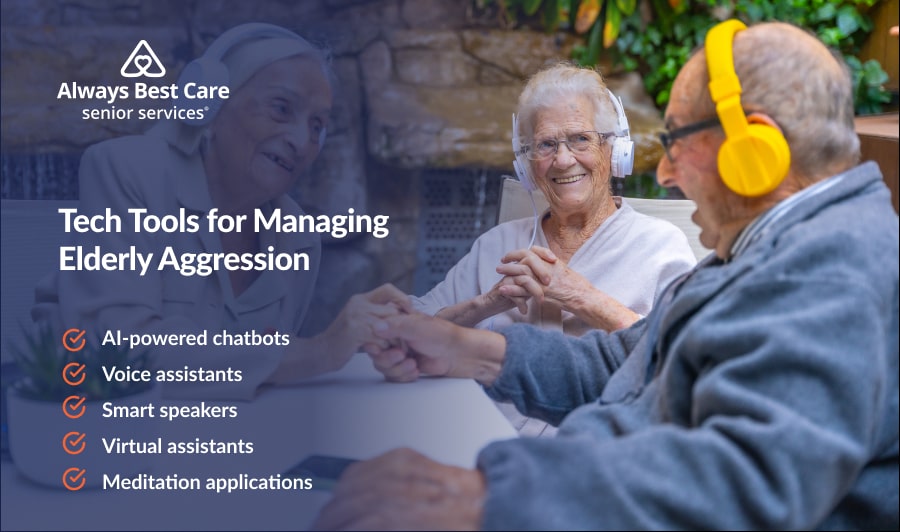
Explore Compassionate Senior Services at Always Best Care
Serving over 250 locations across the U.S. and Canada, Always Best Care delivers dependable and personalized senior care services
Backed by a dedicated team of professionals, we strive to deliver exceptional care that enhances comfort, safety, and quality of life for the individuals and families we serve.
We specialize in supporting individuals living with dementia and their caregivers, offering expert guidance, compassionate support, and meaningful relief through every stage of the care journey.
Our core services include:
- Dementia care services: We support your loved one with personalized dementia care that fosters comfort, routine, and emotional stability.
- Respite care services: Take time for yourself while we provide short-term care that ensures your loved one remains safe and supported.
- In-home care services: We guarantee round-the-clock assistance at home with help in daily living, meal preparation, companionship, and hospice support.
- Skilled home health care services: We manage chronic conditions effectively with personalized clinical care plans tailored to individual needs. Available in select areas.
- Specialized home care services: We leverage advanced technology to monitor health, respond to emergencies, and track wellness remotely.
- Senior living referral services: Find the right senior living community with expert guidance based on your loved one’s lifestyle and care needs.
- Veterans assistance program: We’ll guide you through the process of securing financial support and healthcare services designed for veterans.
Why Are Old People So Mean? FAQs
What causes aggression in the elderly?
Aggression in the elderly is often driven by underlying issues such as dementia, chronic pain, or sleep deprivation. Loss of independence, loneliness, and difficulty communicating needs can also lead to frustration and outbursts, especially in stressful or unfamiliar environments.
Can I prevent rudeness in older adults?
No. You can’t always prevent rude behavior in older adults, especially when it’s driven by underlying health issues like dementia, chronic pain, or emotional distress.
However, by understanding the root causes and adjusting your approach, you can often reduce these behaviors and improve interactions.
Here’s how you can help:
- Identify triggers: Pay close attention to when the behavior occurs. Recognizing and minimizing these triggers can make a significant difference.
- Stay calm and don’t take it personally: Remember that their behavior isn’t about you. Responding with patience and a calm tone can help de-escalate tense situations.
- Meet basic needs: Physical discomfort, hunger, fatigue, or pain can easily lead to irritability, especially when communication is difficult. Make sure these needs are consistently addressed.
- Maintain consistent routines: Predictability provides a sense of stability and control, which can ease anxiety and reduce outbursts.
- Practice empathy and validation: Acknowledge their emotions, even if their response feels unfair. Phrases like “I can see this is upsetting for you” can help defuse tension.
- Consult a medical professional: Sudden or worsening rudeness might signal a medical issue, medication side effect, or cognitive decline. Reach out to a healthcare provider for guidance.
Should I be concerned about sudden changes in behavior?
Yes. If an older adult suddenly becomes aggressive or withdrawn, consult a doctor. It could be a sign of a medical issue, such as an infection, or cognitive decline.


